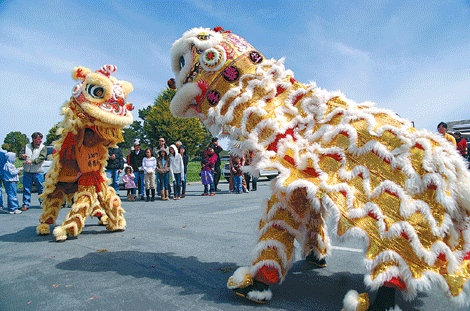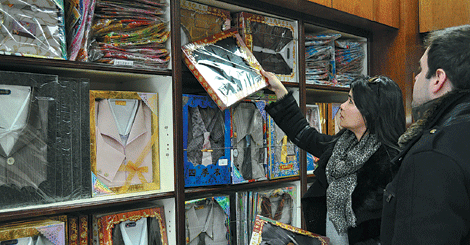Qingming tradition continues in US
|
Tunney F. Lee and his family pay tribute to their deceased relatives ahead of Tomb-sweeping Day at Mt. Hope Cemetery in Boston, Massachusetts, the United States. [Provided to China Daily] |
There's an upsurge of interest in Tomb-sweeping Day in the US as Chinese Americans honor their ancestors, Kelly Chung Dawson reports in New York.
Once a year, Chinese families gather at the graves of deceased relatives, bearing food, wine, joss sticks and paper replicas of worldly delights that their loved ones left behind. The celebration of Qingming Festival, or Tomb-sweeping Day, which falls on April 4 this year, is generally a private affair, but for Chinese Americans, there are numerous ways to celebrate, and a history that demonstrates a long-standing commitment to tradition. The holiday originated with the story of Prince Chonger (697-628 BC), a young royal forced out of the imperial court by a conniving concubine. Accompanied by a loyal government official called Jie Zitui, the prince lived in exile for three years before eventually ascending to the throne. Later, as king, he summoned Jie to his side, but when his previously loyal companion refused to accede to the request, the king burned down the mountain on which Jie lived to force him out. Overcome with remorse, the king designated a day on which Jie's memory would be honored.
Thousands of years later, the holiday bears little resemblance to its origins. But the sentiment remains unchanged: To honor those who came before us and made life possible.
"It is incredibly important to us that we honor our ancestors," said Tunney F. Lee, an urban planer and former professor at the Massachusetts Institute of Technology.
"For first- through third-generation Chinese immigrants in America, it continues to be an important annual tradition."
On Qingming, Lee's family visits the graves of his grandfather and mother, who are both buried in Boston. The family brings chicken, iced wine, incense and paper money. Each member of the family bows three times before the gravestone, lighting incense in honor of the deceased and pouring wine on the ground. In the past, food might have been left at the graves, but "we're practical people", Lee said, with a laugh.
|
Tony Huie, who emigrated to the United States in 1966, checks a paper lantern-shaped money basket at a funeral supplies store in New York's Chinatown. [Wang Jingshu / China Daily] |
Terry Abraham, former head of the Special Collections library at the University of Idaho and author of Chinese Cemeteries and Burial Practices in the Pacific Northwest, described the ritual as an exchange between the living and the dead.
"In a sense, the families are saying, 'We provide you with certain objects and representations of objects, and we are asking you to provide us with your support and good fortune,'" said Abraham. "There is an exchange taking place, and the common sentiment is that people who have died and have gone beyond to the next world are not really very far away at all. They're shadows around the corner, just outside the vision of your eyes, and you can provide them with what they need."
For some families, there is a deeply superstitious element to the ritual.
"In my family, there is an elaborate process of burning joss sticks and bank notes, both when you arrive and when you leave," said Silvia Pan, a student at Macaulay Honors College at the City University of New York, and a third-generation immigrant. "There is a feeling that if you leave without paying, your ancestors will follow you when you leave, and you don't want spirits to follow you. It's really bad luck, so if you don't do everything you're required to do, you'll have bad luck in the next year."
The negative connotations of this superstitious aspect of the holiday may be a contributory factor to why younger generations of Chinese in the US are less interested in the holiday, Pan said.
"I think that because the holiday is centered around the belief that ancestors will give you bad luck if you don't worship them, there's a negative feeling, from an American point of view," she admitted. "It's very superstitious, so I'm not really sure if the younger generations will want to continue celebrating the holiday."
For many third-generation immigrants, whose relatives may be buried on the Chinese mainland or Hong Kong, there is a weaker connection with the past, Pan said.
"For my generation, it's not emphasized at all because all the ancestors we do know are often buried in different places. For my parents' and grandparents' generations, there was much more of a sense that it was a responsibility that you had a duty to fulfill, but I think that feeling is diluted here in the US," she added.
One method by which Chinese immigrants are combating the distance between the deceased and the living is the shipping of burial remains from China to the US, to be reburied closer to the family, said Sue Fawn Chung, professor of history, and the chair of Asian studies at the University of Nevada, Las Vegas, and co-editor of Chinese-American Death Rituals: Respecting the Ancestors.
"There is a belief that the spirit stays with the ashes," Chung said. "Some families will accept a memorial tablet, but for many, the memorial tablet isn't sufficient and the bones of the ancestors must be honored directly."
In "The Chinese Mortuary Tradition in San Francisco's Chinatown", Linda Sun Crowder reported that mortuary directors in the Bay Area have noticed a substantial increase in cases of remains arriving from China for burial in the US.
"As more Chinese immigrants make their homes in America, the remains of loved ones overseas are reunited with the present generation, reversing the previous custom," she writes.
This practice of shipping the remains from China to the US is a reversal of a common practice during the 1800s, when the bodies of Chinese railroad workers who died in the US were shipped home to ensure burial near their families, Crowder said.
In most cases, the bodies were exhumed several years after death, and the bones shipped home in tin boxes. In addition to this practice, approximately 10,000 embalmed bodies were shipped from the US to China at the close of the 1850s, Crowder said, although the practice was later discontinued.
Although Qingming rituals in the US do not differ greatly from those in China, Abraham noted that even within Chinese culture, there are differences. In Taiwan, it is not uncommon to see street vendors selling paper money and other materials for the holiday visit to the grave site. Some cemeteries have buses that shuttle relatives around, he said. Before the "cultural revolution" (1966-76) in the mainland, many parts of the country excluded women from the honor of observing the day.
When Chinese people first began immigrating to the US in large numbers to work on the railroads in the 1800s, they brought a variety of death rituals and customs with them, Chung said. For example, immigrants from Guangdong province brought a strong Taoist concern for feng shui, the ancient belief that the perfect arrangement of buildings, furniture and everyday objects can improve one's life, with regard to the burial site.
The Qingming Festival was among the death rituals celebrated by Chinese immigrants to the US from the very beginning, and a number of newspapers from the era published accounts of the holiday.
According to Wendy L. Rouse, in an essay titled "What We Didn't Understand: A History of Chinese Death Ritual in China and California," one anecdote tells the story of a Caucasian man mocking a Chinese man for placing food and money at a grave site. "Come now, do you really think your ancestors can eat the food, drink the wine, and spend the money?" The Chinese man replied, "As much as your ancestors can sniff your flowers."
Vincent Mak, owner of Fook On Sing, a funeral supply store located in New York's Chinatown, said that business has been steady in recent years.
"The process of celebrating has been simplified somewhat because some of the grave sites here do not allow fire-related activities," Mak said. "But the most important thing is that the offspring still choose to dedicate the day to (honoring) their ancestors' memory."
He also reported that as an increasing number of Chinese marry Westerners, there has been an increase in interest in the holiday in the US.
Pan believes that the holiday will change over time: "I don't think Qingming will fade completely, but maybe it will take on a new meaning," she said. "It happens during spring, so I think that over time it will be more about celebrating life, instead of focusing on death. I believe it will be more positive in the future."
Among the cemeteries that will hold ceremonies in honor of Qingming is Skylawn Memorial Park in the San Francisco Bay Area, which will host performances of traditional lion and folk dances. The cemetery has seen a rapid increase in Chinese funerals and burials during recent years, according to Crystal Tjon, manager and family service counselor at Skylawn.
Another organization that has chosen to focus on spring is the Museum of Chinese in America, which held its second annual Qingming Festival Family Day celebration in New York on April 1. Participants would be able to watch a spring dance performance, learn about the origins of the holiday and make kites in honor of spring.
"Qingming is ultimately about family, paying respect to our ancestors, and also as an awakening for spring," said Karen Lew, education director at MOCA. "And because the day is usually a private experience among families, we're hoping to bring it more into the public sphere."
Contact the writer at kdawson @chinadailyusa.com
Kelly Zhang in San Francisco and Jingshu Wang in New York contributed to this story.
 |
|
Skylawn Memorial Park in the San Francisco Bay Area hosts performances of lion and folk dances to observe Tomb-Sweeping Day. [Provided to China Daily] |
 |
|
Dorothy and her husband Joe choose shirts made of paper for their grandparents who have gone for long time basket at a funeral supply store in New York's Chinatown. [Wang Jingshu / China Daily] |




















